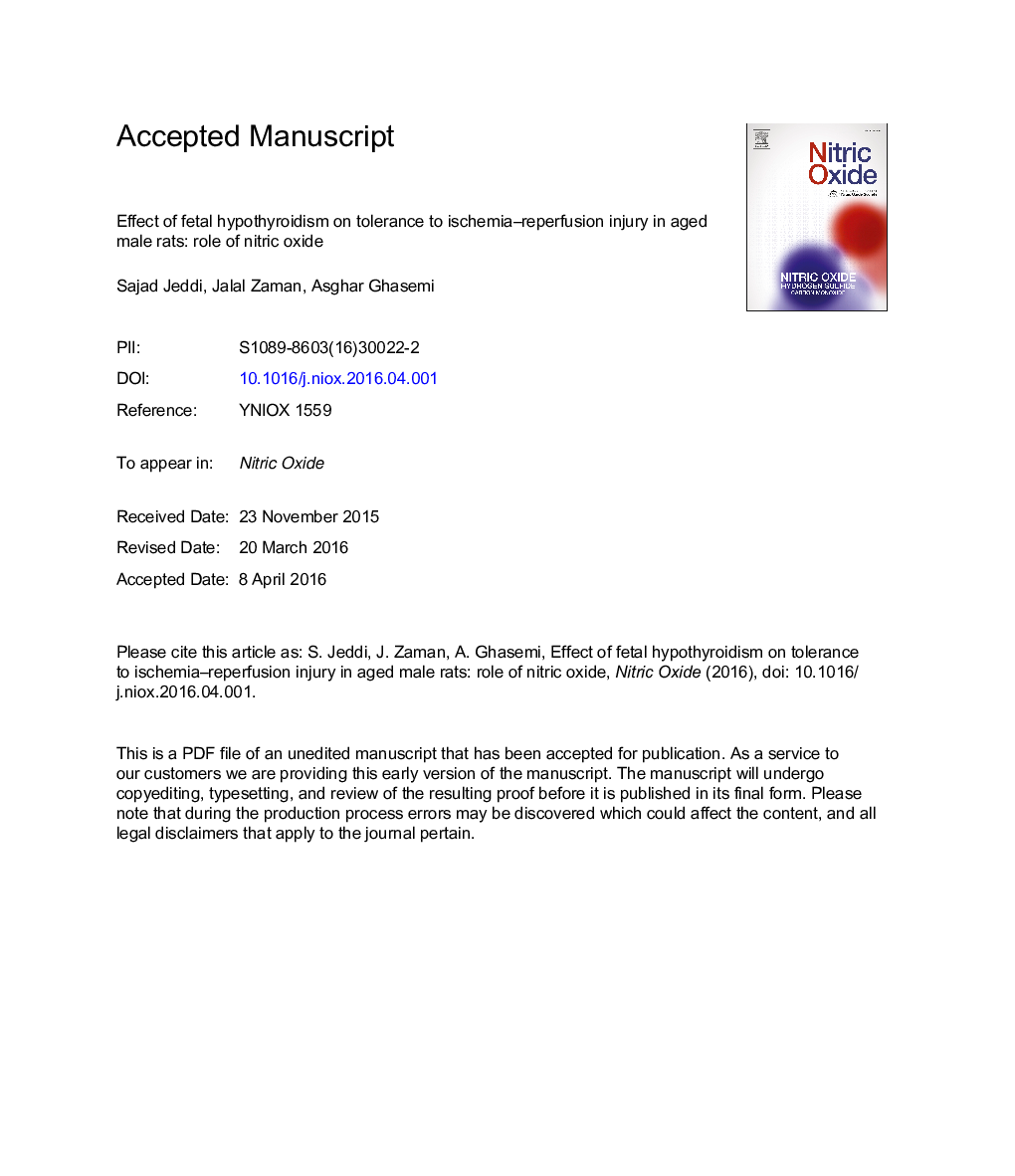| کد مقاله | کد نشریه | سال انتشار | مقاله انگلیسی | نسخه تمام متن |
|---|---|---|---|---|
| 8344912 | 1541604 | 2016 | 33 صفحه PDF | دانلود رایگان |
عنوان انگلیسی مقاله ISI
Effect of fetal hypothyroidism on tolerance to ischemia-reperfusion injury in aged male rats: Role of nitric oxide
ترجمه فارسی عنوان
تاثیر هیپوتیروئیدی جنین بر تحمل به آسیب ناشی از ایسکمی-رپرفیوژن در موش صحرایی نر و ماده: نقش اکسید نیتریک
دانلود مقاله + سفارش ترجمه
دانلود مقاله ISI انگلیسی
رایگان برای ایرانیان
کلمات کلیدی
سالخورده، کم کاری تیروئید جنینی، آسیب مجدد ایسکمی-مجدد اکسید نیتریک، موش
موضوعات مرتبط
علوم زیستی و بیوفناوری
بیوشیمی، ژنتیک و زیست شناسی مولکولی
زیست شیمی
چکیده انگلیسی
Aging is associated with increased prevalence of cardiovascular disease. Thyroid hormone deficiency during fetal life decreases myocardial tolerance to ischemia-reperfusion (IR) injury in later life. The long-term effects of fetal hypothyroidism (FH) on response to IR injury in aged rats have not been well documented. The aim of this study was therefore to compare the effect of FH on tolerance to IR injury in young and aged male rats and to determine contribution of iNOS (inducible nitric oxide synthase), Bax, and Bcl-2. Pregnant female rats were divided into two groups: The FH group received water containing 0.025% 6-propyl-2-thiouracil during gestation and the controls consumed tap water. Isolated perfused hearts from young (3 months) and aged (12 months) rats were subjected to IR. Hemodynamic parameters, infarct size, and heart NOx (nitrite+nitrate) levels were measured; in addition, mRNA expression of iNOS, Bax, and Bcl-2 and their protein levels in heart were measured. Recovery of post-ischemic LVDP and ±dp/dt were lower and infarct sizes were higher than controls in aged FH rats (68.38 ± 6.7% vs. 50.5 ± 1.7%; P < 0.05). Aged FH rats had higher heart NOx values than controls (74.3 ± 2.6 vs. 47.6 ± 2.5 μmol/L, P < 0.05). After IR, in FH rats, mRNA expression of iNOS and Bax were higher and Bcl-2 was lower in both the young (350 and 240% for iNOS and Bax, respectively and 51% for Bcl-2) and aged rats (504 and 567% for iNOS and Bax, respectively and 67% for Bcl-2). Compared to controls, in FH rats protein levels of iNOS (37% for young and 45% for aged rats) and Bax (94% for young and 118% for aged rats) were higher while for Bcl-2 (36% for young and 62% for aged rats) were lower. After IR, in FH rats, aminoguanidine, a selective iNOS inhibitor, decreased mRNA expression of iNOS and Bax and increased expression of Bcl-2 in both young (65% and 58% for iNOS and Bax, respectively and 152% for Bcl-2) and aged rats (76% and 64% for iNOS and Bax, respectively and 222% for Bcl-2). In addition, in the heart of FH rats, aminoguanidine decreased protein levels of iNOS (47% for young and 60% for aged rats) and Bax (57% for young and 80% for aged rats) and increased protein levels of Bcl-2 (124% for young and 180% for aged rats). In conclusion, thyroid hormone deficiency during fetal life decreases tolerance to IR injury in aged rats; this effect is at least in part, due to increased expression of iNOS and Bax-to-Bcl-2 ratio in the heart and is restored by iNOS inhibition.
ناشر
Database: Elsevier - ScienceDirect (ساینس دایرکت)
Journal: Nitric Oxide - Volumes 55â56, 1 Mayâ1 June 2016, Pages 82-90
Journal: Nitric Oxide - Volumes 55â56, 1 Mayâ1 June 2016, Pages 82-90
نویسندگان
Sajad Jeddi, Jalal Zaman, Asghar Ghasemi,
